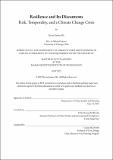Resilience and Its Discontents: Risk, Temporality, and a Climate Change Crisis
Author(s)
Shi, Kevin Kaiwen
DownloadThesis PDF (322.1Kb)
Advisor
Wendel, Delia Duong Ba
Terms of use
Metadata
Show full item recordAbstract
In the aftermath of Hurricane Sandy in 2012, significant funding and numerous initiatives have sought to prepare the United States for future storms and flooding. Resilience has emerged as one of the most important concepts in discourse about climate change and urban planning, central to decisions about investments, urban development, and budgeting. Furthermore, it has taken shape as a large industry with conferences, professionals and advisors, and indices and metrics all meant to improve the preparedness and resiliency of various entities ranging from individuals and companies to cities and regions. However, resilience is not a purely technocratic and objective metric as it is often presented. This thesis examines resilience as a political and economic project, a technology for governing risks associated with climate change. In the process of this governance, the assumptions and understandings implicit within resilience, and deeply held by those working in the field, produce uneven outcomes. Unlike other paradigms like sustainability and mitigation, resilience aims not to solve the problem of global climate change but rather to protect short-term against its impacts. Engaging with fields like geography, science, technology and society (STS), and anthropology, I argue that resilience has a temporal element — it does not aim to solve the problem of climate change, its future is instead postponed in the attempt to preserve an endless present. This present is portrayed as a crisis and resilience is framed as the way to prevent further destabilization. Crisis however, much like Naomi Klein’s disaster capitalism complex, is enormously profitable for a number of elite stakeholders including real estate developers and insurance corporations. In opposition to a resilience project in New York City, opponents have called for true resiliency. My thesis attempts to hold resilience accountable and create space for meaningful responses, ones that center solutions and climate justice.
Date issued
2022-05Department
Massachusetts Institute of Technology. Department of Urban Studies and PlanningPublisher
Massachusetts Institute of Technology